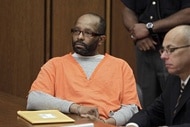What Is The Significance Of The Book 'Papillon' In ‘Extremely Wicked?'
"Papillon," the story of a man wrongfully convicted who escapes prison, was allegedly a favorite of Ted Bundy’s.

Ted Bundy was an avid reader — reportedly often reading Nobel Prize-winning Russian literature as he waited in court during his murder trial — but supposedly one of his favorite books was “Papillon,” an autobiographical odyssey of an innocent man sent to prison for a murder he didn’t commit.
The book plays a central role in the new Ted Bundy biopic, “Extremely Wicked, Shockingly Evil and Vile,” now streaming on Netflix.
Bundy, played in the film by Zac Efron, asks his girlfriend Liz, portrayed by Lily Collins, to read the novel in the hopes that she’ll learn more about what it's like to be wrongly accused.
“He obsesses over the day that he’ll be free and spends years hatching escapes, getting caught, punished, beaten, betrayed, but he never loses hope. And that’s what I wish for us, Liz, that we never lose hope,” Bundy exclaims in the film.
Joe Berlinger, the film’s director, told Oxygen.com the "Papillon" line was in the original script for the film and is used in the fictionalized movie to show how Bundy is able to “gaslight” his girlfriend into believing he’s been wrongly accused just like the protagonist in the book.
“Our entire movie is about how Ted, a psychopath, seduces everyone around him into thinking he was not capable of these crimes. This book is a part of that attempt to deceive Liz that Ted is wrongfully accused,” Berlinger explained.
While Berlinger said the scenes related to the novel were the screenwriter’s invention, Bundy really did like the book, according to Ann Rule’s true crime novel about Bundy, "The Stranger Beside Me.”
“He told me he was reading a great deal, the only respite he had from television soap operas and game shows,” Rule wrote in the book. “His favorite book was ‘Papillon,' the story of an impossible prison escape from Devil’s Island.”
Bundy reportedly told Rule he had already read the heroic tale four times.
She references the book again after Bundy makes his own first escape from prison — he’d have two — after jumping from the Pitkin County courthouse library in 1977.
“He must have felt like the protagonist of ‘Papillon,' the book he’d almost committed to memory during his long months in jail,” she wrote. “Beyond the cleverness of escape, Papillon had dealt with mind control, man’s ability to think himself past despair, to control his environment by sheer force of will. Was Ted doing that now?”
While its not known whether Bundy really asked Kloepfer to read the book, too, she did write in her book, “The Phantom Prince: My Life With Ted Bundy,” written under the pen name Elizabeth Kendall, that the pair had a book club while he was in jail and would often read the same novels.
She references the book “Shogun,” by James Clavell, a story about a bold English pilot whose ship is blown ashore in Japan and the beautiful interpreter he falls in love with, and said the duo read the story at the same time and exchanged letters about it.
In one of the letters, Bundy discusses a part of the book that describes the hero after his love has been killed and compared the section to his own love for Kloepfer.
“I feel you there, looking over my shoulder, a very powerful force in my life,” he allegedly wrote in a letter from prison. “Even though it is winter in my life, I still need you; I still love you.”
Kloepfer wrote in the book she felt the same way about Bundy, noting, “He was always there, looking over my shoulder.”
Despite his conviction at the time for kidnapping, Kloepfer said she didn’t want “to stop loving him or erase the power of his love from my life.”
Unlike the hero in the autobiography “Papillon," Bundy would not free himself from prison to go on to live a happy life. Instead, he’d die in the electric chair in 1989 after he killed more than 30 women.


























